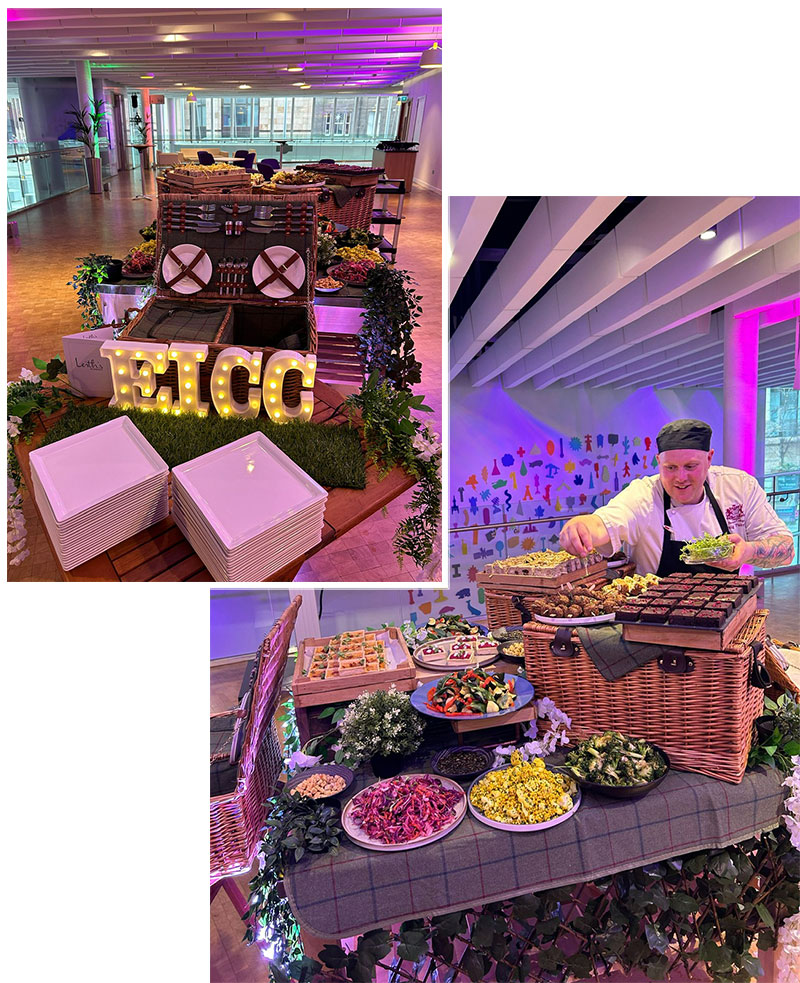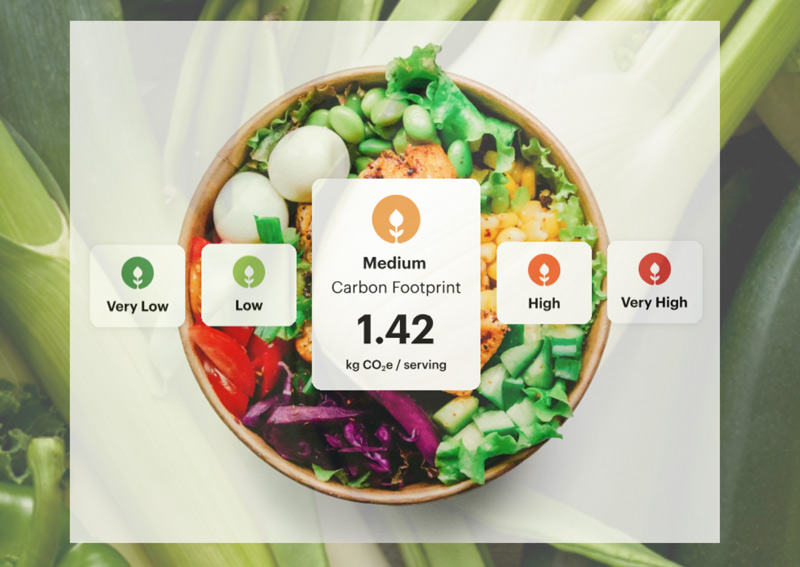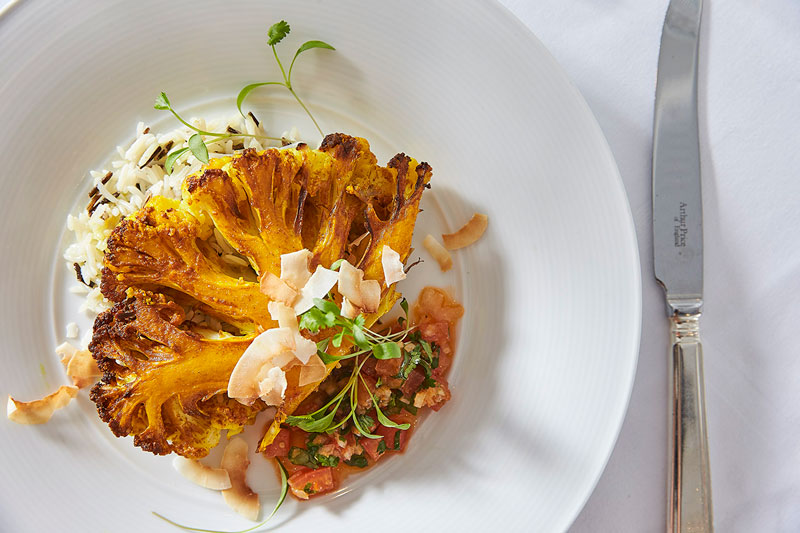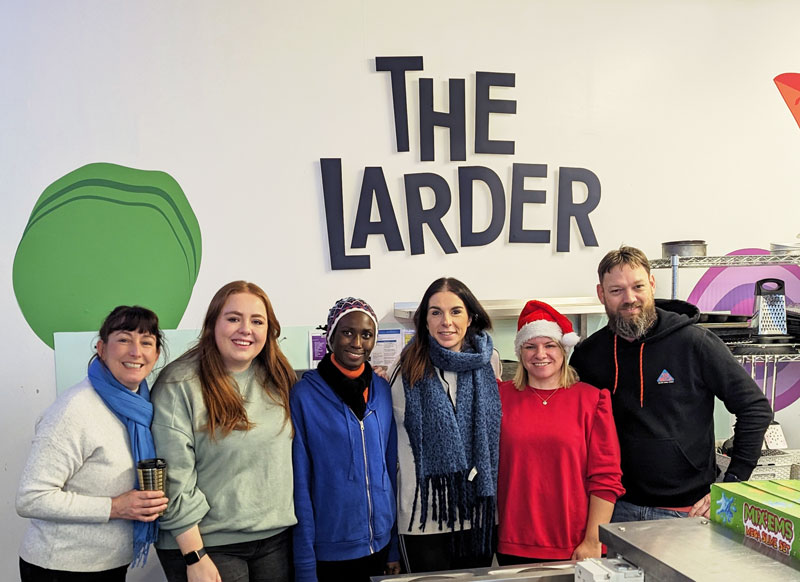
At EICC, we pride ourselves on our forward-thinking ethos. We have ambitious sustainability goals which we couldn’t achieve without the support of a supply chain which shares the same values. Here’s how we work with our catering partner, Leith’s, to drive positive change in the events industry.
OUR SUSTAINABILITY philosophy revolves around a triple-bottom-line approach, emphasising economic, environmental, and societal considerations. This complete approach to sustainability ensures that our business decisions not only drive economic growth, but also foster positive environmental and social impacts.
Leith’s (whose parent company is Levy UK & Ireland) has been our catering partner since the EICC opened in 1995. Since that time, our partnership has evolved to reflect changing social, environmental and cultural demands. In the face of a growing climate emergency, today Leith’s and the EICC are united in our commitment to offer more sustainable food options at our events.
From seasonal produce, to carbon labelling and food waste apps, Claire McHardy, General Manager at Levy, explains what Leith’s is doing to create a greener future in the catering and events space.
Fresh ideas - and local, seasonal produce
One of the latest new offerings from Leith’s is a creative and colourful ‘Picnic Basket’ lunch concept for events of up to 150 people. “We now offer a really nice ‘picnic basket’ display, where delegates can choose different options ahead of time,” says Claire. “They can choose foods from each of the five different categories; protein, salads, quiche, sweet etc, and they can see the environmental impact each choice makes to their overall meal.”

Leith’s designs its menus around available, locally sourced produce in order to limit the environmental impact of importation and travel, and they use produce from local businesses like Yester Farm, Breadwinner Bakery and Tobermory Smokes.
Due to the environmental impact of salmon farming, Leith’s has switched to smoked trout, which has 20% less carbon emissions than smoked salmon. Similarly, the company has switched from EU flour to Wild Farmed Flour, which requires 12% less carbon emissions to produce than EU flour. Additionally, the company aims to make all desserts non-dairy by the end of 2024.
Seasonality is a major focus in Leith’s sustainability mission, too. “In our new menus, we include dishes such as a seasonal slaw, using only produce that is available at a specific time of year, currently this would consist of produce like red cabbage, carrots, apples”, says Claire.
“With our dinner main courses, we're aiming to make them dairy and gluten-free where possible. So many people have allergies or intolerances nowadays. We can limit overproduction - and therefore food waste - by making all of the dishes dairy and gluten-free, rather than offering different dishes for guests with allergies or dietary preferences. It also reduces the likelihood of a delay serving dishes, and promotes more inclusivity in the catering space.”
Making more sustainable food choices
Leith’s works closely with clients to agree on menus ahead of their events, and those menus can change a lot depending on the event’s demographic. The latest popular dinner choices include miso-roasted celeriac, soy and chilli glazed aubergine and a black onion seeded halloumi and noodle salad. Sometimes, conference organisers will opt for an entirely meat-free day and people barely notice the absence of meat, says Claire - a fact she puts down to the good quality produce and creative menus by the Leith’s chefs.
The stats on the impact of meat dishes versus plant-based meals speak for themselves. Out of 1,000 conference attendees, a lunch of beef pie resulted in 3,206kg of CO2e (the equivalent of around 18,000 miles in a car), whereas the plant-based option resulted in only 351kg - approximately 2,500 miles in a car. However, many clients are slowly but surely incorporating more sustainable food options into their events, says Claire.
Placing the plant-based options at the top of the menu, as opposed to meat options first … makes plant-based dishes the first option for people, rather than a secondary ‘just for veggies’ choice.
“I think people can still have preconceived ideas about meat free dishes, what often happens during menu tastings with clients is that they enjoy the meat free option and realise that it is just as tasty and substantial as the meat option” Claire explains. “We hosted a client recently who still wanted a meat dish but switched from lamb to venison, which is a more sustainable option, and they opted for a vegetarian starter.”
Some of the work Leith’s does to help promote plant-based options is simple but effective - like placing the plant-based options at the top of the menu, as opposed to meat options first, followed by veggie dishes. The idea, Claire says, is to make plant-based dishes the first option for people, rather than a secondary ‘just for veggies’ choice.
Foodsteps labelling

“Obviously, the food labelling isn’t there to try to stop anybody from eating what they want - it’s to give people the option to make an informed decision.”
To keep clients and delegates informed on the environmental impact of their food choices, Leith’s is now working with Foodsteps. It’s a calculator tool and food labelling system that allows users to build granular insights on their food footprint through packaging, ingredient origin, cooking methods, storage, food waste, transport and beyond. These are then communicated through carbon impact labels.
“It’s a ‘cradle to grave’ rating,” says Claire. “Our new menus rate the food choices from A, being most environmentally friendly, to F, which is the least. We first introduced it in our street food options in August 2023, during the Edinburgh Festival.
“The feedback indicated that in many cases customers put more thought into their food choices. Obviously, the food labelling isn’t there to try to stop anybody from eating what they want - it’s to give people the option to make an informed decision.”
Food and drinks packaging
With annual plastic production having grown over 20-fold in the past 50 years, reducing plastic waste is high on Leith’s agenda. They regularly work with Event Cups, especially during the Edinburgh Festival, where Leith’s serve a variety of street food to festival go-ers. Event Cups allow for up to nine uses, beating the lifecycle of single use plastic by far.
For the street food packaging itself, Leith’s use Notpla “disappearing packaging”, which uses a 100% natural seaweed coating (as opposed to plastic). The seaweed coating can either be washed off and the packaging goes into paper recycling, or it can go straight into food waste recycling.
Next on the agenda for Leith’s is to have a water filtering facility on site. Claire explains, “Instead of buying cases of sparkling water or still water, we'll have a system to filter our own water on site. We obviously have lovely Scottish water anyway, so by having reusable glass bottles to fill, we hope it’ll stop the culture of throwing away so much glass and plastic.”
Other sustainable choices

“It’s all about using the whole part of a product … we’re being more mindful of how we use food, and how we can reduce food waste.”
Beyond the tasty creations the chefs cook up in the kitchen, Leith’s has also begun working with an app called Olio to manage food waste and provide for people in need. The team informs the app of any leftover food they have on a certain day, stores it at the correct temperature, then prepares it for the delivery workers to collect. Anyone in the local community facing food deprivation can then go and pick up their meal for free. So far, 100% of the food Leith’s has given to Olio has been redistributed.
Leith’s also follow a whole produce approach to cooking. For example, when cooking with onions, instead of throwing the skin away the chefs will dehydrate it, fry it and make it into crisps. “It’s all about using the whole part of a product,” says Claire. “Cauliflower leaves are another example. They’re fully edible, so can be used for things like soup stock. We’re being more mindful of how we use food, and how we can reduce food waste.”
Since 2022, Levy has also sponsored ‘The Biohub’, a regenerative agricultural project in the uplands of North Yorkshire. The scheme has spent the last 14-months designing, developing and showcasing regenerative approaches to farming on a 92-acre plot of previously fallow grazing land. The company has hosted ‘discovery days’ there with members of the culinary and operational teams, as well as its clients, to explain more about how sustainable farming techniques can help Levy to achieve its climate net zero 2027 goal.
Volunteering opportunities
Outside of environmental measures, ‘social sustainability’ is a field in which Leith’s also continues to excel. The company has a longstanding partnership with The Larder, a Scottish social enterprise whose mission it is to empower disadvantaged children, young people, adults and communities to improve their life chances through access to learning and good food.

At Christmas, for example, some of the team from Leith’s and the EICC packed up food and delivered meals to people in need across West Lothian – and there are further plans in the pipeline for the partnership. “Our chefs are going to host a training session with The Larder staff to teach disadvantaged people how to cook, while feeding the local community too,” says Claire.
Another way Levy is giving back to the community this year is the 1,000 mile relay to help raise funds for the ParalympicsGB. The relay will take place in April and May, and cover 1,000 miles across Scotland, England and Wales. Levy is inviting members of the public to join on one or more of the 45 legs to support ParalympicsGB on their journey towards achieving greatness on the global stage.
